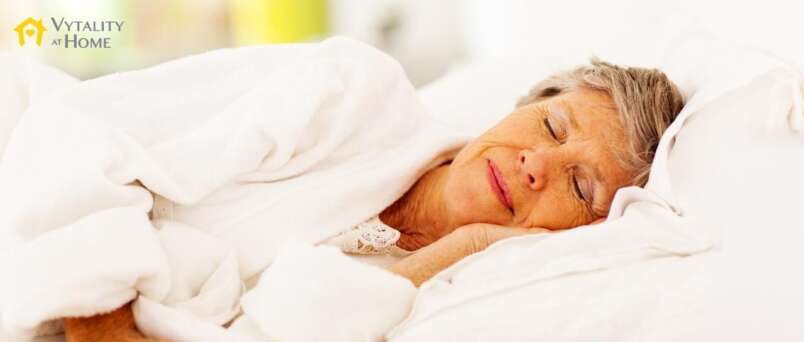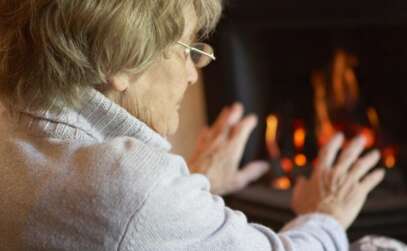Are 5 hours a night enough? Seniors and the need for quality sleep
We spend almost one third of our lives asleep, and studies show that it’s important for our health to get enough quality sleep. As we grow older, we may experience changes in our sleep patterns that prevent us getting the sleep we need.
Sleep and aging
Many people think that poor sleep in an inevitable part of aging. However, this is not always the case. Issues with sleep in seniors can be due to aging in a part of our brain that controls our “master clock”, the suprachiasmatic nucleus (SCN). The SCN controls our body’s 24 hour daily cycles, known as the circadian rhythms. An aging SCN can cause these rhythms to get out of sync, which in turn affects how tired we feel and when we’re wide awake.
The way to better sleep overall is to try and maintain/restore the natural circadian rhythms as much as possible, and “help out” the SCN. It’s also harder for seniors to ‘catch up’ on lost sleep too. So, it’s beneficial to work out what else might be affecting the quality of our sleep as seniors, rather than always assigning it to ‘old age’.
Causes of poor sleep in seniors
Here are six causes of poor sleep in seniors, and some top tips to help improve sleep quality.
1) Insufficient daylight
One of the key ways the SCN maintain our circadian rhythms is through natural light reaching our eyes. If we are not exposed to sufficient natural light, we may find it difficult to sleep at night, or fall asleep more during the day. Seniors who have restricted mobility might prefer to stay indoors more, and therefore limit the amount of natural light they are exposed to.
Tip: getting outside into the daylight, even just for a short while, will help your body understand when it’s time to sleep.
2) Less melatonin
As we age, we produce less of key hormones that control sleep, such as melatonin and cortisol. Melatonin is usually produced in response to darkness, and is part of the control mechanism for the circadian rhythms. As we age, we produce less melatonin, and become less response to darkness as a stimulus to sleep.
Tip: Listening to music can help you relax at nighttime, and help you fall asleep quicker, according to researchers in Taiwan.
“Listening to calming music at bedtime improved sleep quality in older adults. … Calming music may improve sleep by slowing your heart rate and breathing, and lowering your blood pressure. This, in turn helps lower your levels of stress and anxiety.”
3) Medications that make you feel drowsy
Medications that you may take to control long-term health conditions may also affect when you feel sleepy. Medications for pain and antihistamines may make you feel drowsy during the day while antidepressants might keep you awake. And of course the more medications you need to take, the more likely that some may interact and make you feel sleepy at the wrong times of day.
Tip: Talk to your physician is you feel your medications are affecting your sleep quality. They may be able to swap out medications that make you sleepy with others that don’t, or adjust when you take the medications during a 24 hour period.
4) Not enough exercise
If you’re not doing much during the day, your body won’t be as physically tired. So you may find it harder to fall asleep. Simply increasing the exercise you do can help you fall asleep naturally, and enjoy better quality sleep too.
Tip: Exercise every day, whether it’s a trip to the store, a gentle stroll, some gardening, or a series of specific exercises you can do at home designed for your specific level of mobility and fitness.
5) Boredom
As we age, we can’t always do what we used to as often. There may be days when we’re bored, just sitting around, and inevitably we will “nod off” to sleep.
Tip: Engagement and mental stimulation are key to keeping seniors awake, alert and active. That’s why at Vytality at Home, our homeware caregivers love to spend time hatting, sharing memories, discussing the news, playing games or solving puzzles. Many of our less mobile clients look forward to their home care visit for the company, enjoyment and fun as much as the physical help and chores.
6) An old mattress!
A poor quality or old mattress can seriously affect the quality of sleep. A new mattress will provide better physical support during the night, and (if required) adapt to the contours of your body, reducing the the load on certain joints. A firm “edge perimider support” (.e. the mattress edge) can also make it easier to for those with restricted mobility to transfer from bed to standing, or from bed to walking frame or wheelchair.
Tip: Take a look at the National Mattress website article here for some great tips on choosing a new mattress, and the benefits for seniors of the different types.
How much sleep do seniors need?
The short answer is, exactly the same as the rest of us, namely 7-8 hours of sleep a night. However, aging can affect not just the quality of sleep but the time we take to fall asleep, known as sleep latency. So if you go to bed at the same time all your life, you will “lose” some sleep time overall if it takes you longer to fall asleep.
You may also wake more during the night. This is because your normal four stage cycle of sleep changes, so you have less slow-wave NREM and REM sleep than when you were younger. This makes you more susceptible to waking during the night.
Blue light and senior sleep
Whatever our age, exposure to blue light at night can confuse our SCN and keep us awake. Blue light is emitted from all electronic screens, including smart phones, tablets, laptops and televisions. Anyone with issues falling asleep should turn off these devices and lower the lights in their bedroom to help them fall asleep. Some smart phones also have night-time modes, where the screen is lit by warmer colours and notifications are turned off so you won’t get woken by a late night message or a reminder.
Poor sleep and dementia
Research from the Harvard-affiliated Brigham and Women’s Hospital has pointed to a connection between lack of sleep in seniors and an increased risk of dementia. The finding pointed to both time taken to fall asleep and the amount of sleep increasing the risk.
“Routinely taking 30 minutes or longer to fall asleep was associated with a 45 percent greater risk for incident dementia.”
and
“Sleep deficiency at baseline, when the average age of participants was 76 years old, was associated with double the risk of incident dementia and all-cause mortality over the next four to five years.”
Charles Czeisler, chief of the Division of Sleep and Circadian Disorders
Not just seniors
According to an article in the Globe and Mail:
“About one-third of adults report insomnia symptoms, according to the Canadian Family Physician journal, and that number rises to 40 per cent among people 65 and older.”
So poor sleep quality is something we can all experience and should all address, regardless of our age!
Help with senior sleep
If you’re concerned about your senior loved ones living at home and sleeping because they are bored, call us. Our caregiver team can visit on a weekly or more frequent basis to give your loved on company, engagement and cognitive activities to keep their mind active. This becomes more important as the winter months approach and opportunities for the less mobile seniors to go outside become more limited.
Contact us to discuss your requirements – we’e here to help.




